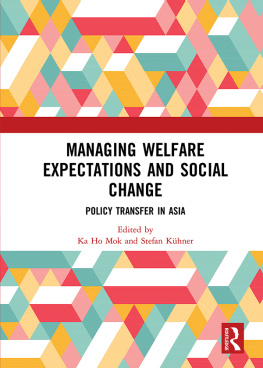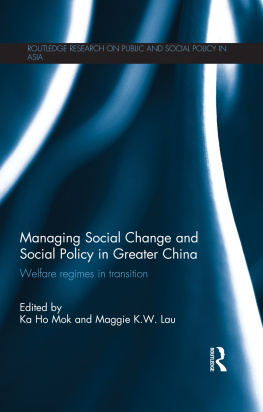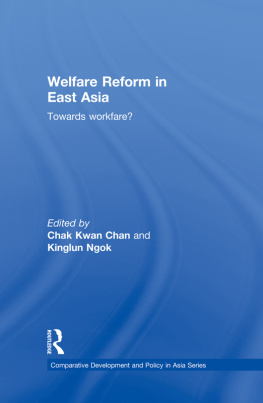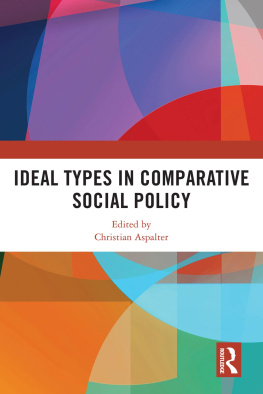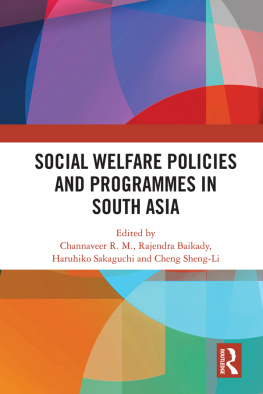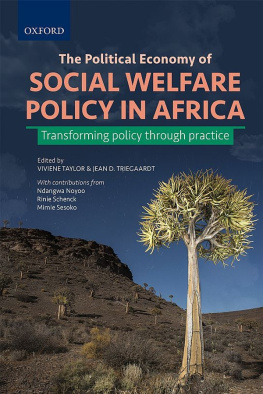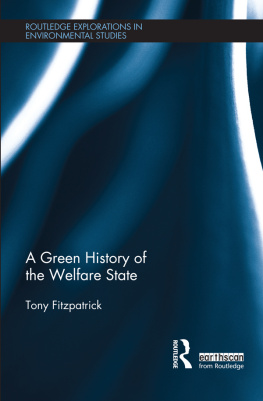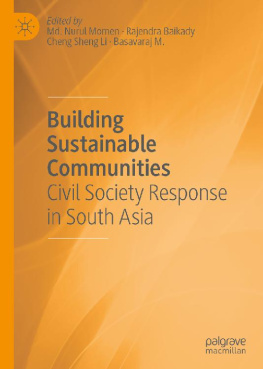Managing Welfare Expectations and Social Change
Much has been written about the challenges Asian governments face in response to rapid socio-economic changes and the resulting social needs and welfare expectations. Indeed, heated debates have emerged when scholars in social development, social welfare and social policy conducted more systematic comparative research related to the diverse policy measures adopted by Asian governments: Which welfare models or typologies best describe Asian cases after the 2008 global financial crisis? How can contemporary social policy transformations in Asia be appropriately conceptualized? Are particular best practice examples evolving in Asia and if so, can they be successfully transferred to enhance social welfare governance among Asian economies? This book combines contributions that address Asian government responses in light of the above questions. In doing so, it revisits the broad theoretical literature on policy transfer and provides empirical examples to explore the spread of ideas, social policies and programmes across Asia from varying analytical and methodological perspectives.
The chapters originally published as a special issue in the Journal of Asian Public Policy.
Ka Ho Mok is Lam Man Tsan Chair Professor of Comparative Policy at Lingnan University, Hong Kong. He has extensive research experience in international higher education and comparative social policy with focus on Asia and contemporary China. He is Editor-in-Chief of Journal of Asian Public Policy (Routledge) and Asian Education and Development Studies (Emerald). He is also book series editor of Routledge series of Comparative Development and Policy in Asia and Palgrave Macmillan series of Social Policy and Development Studies in East Asia.
Stefan Khner is Assistant Professor and Programme Director for the Master of Social Sciences in Comparative Social Policy (International), Department of Sociology and Social Policy, Lingnan University, Hong Kong. His academic interest centres on comparative and global social policy with particular emphasis on the policies and politics of productive and protective welfare.
Managing Welfare Expectations and Social Change
Policy Transfer in Asia
Edited by
Ka Ho Mok and Stefan Khner
First published 2018
by Routledge
2 Park Square, Milton Park, Abingdon, Oxon, OX14 4RN, UK
and by Routledge
711 Third Avenue, New York, NY 10017, USA
Routledge is an imprint of the Taylor & Francis Group, an informa business
2018 Taylor & Francis
All rights reserved. No part of this book may be reprinted or reproduced or utilised in any form or by any electronic, mechanical, or other means, now known or hereafter invented, including photocopying and recording, or in any information storage or retrieval system, without permission in writing from the publishers.
Trademark notice: Product or corporate names may be trademarks or registered trademarks, and are used only for identification and explanation without intent to infringe.
British Library Cataloguing in Publication Data
A catalogue record for this book is available from the British Library
ISBN 13: 978-1-138-56404-6
Typeset in MyriadPro
by diacriTech, Chennai
Publishers Note
The publisher accepts responsibility for any inconsistencies that may have arisen during the conversion of this book from journal articles to book chapters, namely the possible inclusion of journal terminology.
Disclaimer
Every effort has been made to contact copyright holders for their permission to reprint material in this book. The publishers would be grateful to hear from any copyright holder who is not here acknowledged and will undertake to rectify any errors or omissions in future editions of this book.
Contents
Ka Ho Mok and Stefan Khner
Nick Ellison
Joachim Betz and Daniel Neff
Stefan Khner and Keerty Nakray
Liu Tao
Shih-Jiunn Shi
Peter Abrahamson
Nan Yang
The chapters in this book were originally published in the Journal of Asian Public Policy, volume 10, issue 1 (March 2017). When citing this material, please use the original page numbering for each article, as follows:
Ka Ho Mok and Stefan Khner
Journal of Asian Public Policy, volume 10, issue 1 (March 2017) pp. 17
Nick Ellison
Journal of Asian Public Policy, volume 10, issue 1 (March 2017) pp. 824
Joachim Betz and Daniel Neff
Journal of Asian Public Policy, volume 10, issue 1 (March 2017) pp. 2539
Stefan Khner and Keerty Nakray
Journal of Asian Public Policy, volume 10, issue 1 (March 2017) pp. 4056
Liu Tao
Journal of Asian Public Policy, volume 10, issue 1 (March 2017) pp. 5773
Shih-Jiunn Shi
Journal of Asian Public Policy, volume 10, issue 1 (March 2017) pp. 7489
Peter Abrahamson
Journal of Asian Public Policy, volume 10, issue 1 (March 2017) pp. 90103
Nan Yang
Journal of Asian Public Policy, volume 10, issue 1 (March 2017) pp. 104120
For any permission-related enquiries, please visit:
http://www.tandfonline.com/page/help/permissions
Peter Abrahamson is Associate Professor of Sociology at University of Copenhagen, Denmark.
Joachim Betz is Professor Emeritus at the Institute of Political Science at the University of Hamburg, Germany.
Nick Ellison is Professor of Social Policy at the University of York, UK.
Stefan Khner is Assistant Professor and Programme Director for the Master of Social Sciences in Comparative Social Policy (International), Department of Sociology and Social Policy, Lingnan University, Hong Kong.
Liu Tao is a Junior Professor at the Institute of East Asian Studies and at the Institute of Sociology in the Faculty of Social Sciences, University of Duisburg-Essen, Germany.
Ka Ho Mok is Lam Man Tsan Chair Professor of Comparative Policy at Lingnan University, Hong Kong.
Keerty Nakray is an Associate Professor at Jindal Global Law School in NCR Delhi, India and Visiting Fellow at the Feinstein International Center, Tufts University, USA.
Daniel Neff is Research Fellow at the GIGA Institute of Asian Studies, Germany.
Shih-Jiunn Shi is a Professor in the Graduate Institute of National Development, National Taiwan University, Taiwan.
Nan Yang is a PhD Graduand in the Department of Social Policy and Social Work at the University of York, UK.
Ka Ho Mok and Stefan Khner
Introduction
Much has been written about the challenges Asian governments face in regards to growing welfare expectations and social change. High-income cases across Asia have been characterized as having to deal with external and internal pressures not unlike the ones experienced in OECD/EU countries (Taylor-Gooby 2009, Hemerjick 2013). At the economic level, globalization and technological change have increasingly led to the creation of new social risks and due to ensuing transitions in national production processes and labour markets growing inequality and uncertainty (Hwang 2011, Izuhara 2013, Mok 2017). At the social level, changes in family structures and family life have in conjunction with persistent gender inequality contributed to low fertility rates and ageing populations putting significant pressures on social budgets particularly pensions, health and social care (Kim and Choi 2013, Sung and Pascall 2014; Ku 2016). New evidence suggests that governments in Greater China and East Asia face growing welfare expectations that go beyond the human capital-focused, family-oriented and work-centred approaches that have driven the welfare discourse after the 1997 and 2008 financial crises (Mok and Lau 2014, Ngok and Chan 2016). As for other Asian countries, debates have centred on concerns that recent socio-economic transitions threaten to trap them in low- or middle-income status as large productivity gaps, imbalances in the key sources of economic growth, but also rising inequality, wage demands as well as environmental constraints continue to affect public and social policy making in the region (Surender and Walker 2013, Devine

